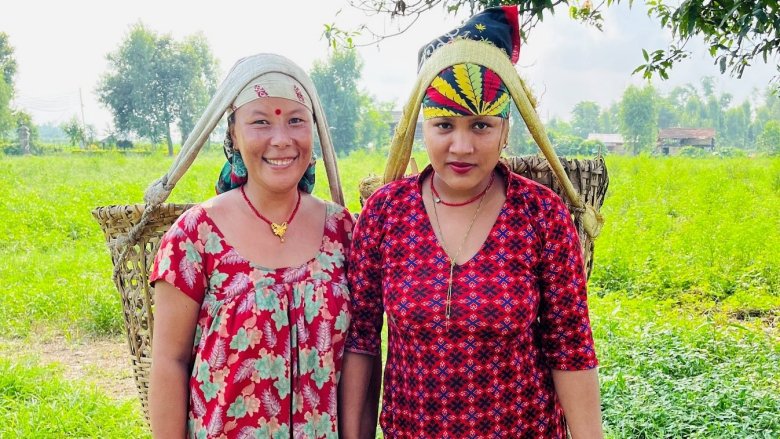Switching from wood to biogas transformed Nanu Ghatani’s life.
Before she became a participant in Nepal’s Biogas Stoves Project, run by the country’s Alternative Energy Promotion Centre, she spent a large part of her day foraging for fuelwood in the forest.
But after she began using biogas fuel – methane produced through the breakdown of dung and vegetation – she gained back roughly 16 hours a week that were previously spent on such tasks as firewood collection, cooking, cleaning utensils, and water collection.
“I was a housewife only and my home was my world,” said Ghatani, whose activities were measured and tabulated along with 7,200 other women who participated in the project applying the W+ Standard. “I was scared to even mention my name. But today, people know me as Nanu Ghatani the community worker, they know me as an individual. I have succeeded in establishing myself my own identity.”
On average, the time savings for women switching fuel, measured by the W+ – a certification approach developed by Women Organizing for Change in Agriculture and Natural Resource Management (WOCAN) – working in cooperation with the Nepalese government, was 2.6 hours a day.
W+ is a certification framework that provides metrics and procedures to quantify, verify, and monetize women’s empowerment results within projects and supply chains, measuring six areas of improvement, including time savings, health, education and knowledge, food security, income and assets, and leadership. The standard was launched in 2014 to provide a practical approach to sustainable landscape project teams that can use it to support women farmers, women’s groups, and women-led enterprises to generate carbon and gender credits. It offers a way to provide payments to women and project developers, enabling investors and companies to confidently support their claims for women’s empowerment through the purchase of W+ credits.
In addition, at least 20 percent of the revenue from the sale of W+ credits must be returned to women’s groups active in the project area to spend as they desire.
Many projects claim they are aiding women, but with no credible way to show this, they risk being accused of “pinkwashing,” said Jeannette Gurung, the founder and Executive Director of WOCAN who developed the W+ Standard.
Rather than just tabulating the number of women participating in a project, as a market-based approach, W+ allows accurate measurement of impact and revenue generation to sustain activities that secure women’s empowerment.
Growing Interest
The success of the Biogas Stoves Project has contributed to the cross-pollination of another project in Nepal that is working with the Global Partnership for Sustainable and Resilient Landscapes (PROGREEN). PROGREEN works to support rural livelihood development and landscape restoration while tackling declining biodiversity, forest loss, and deteriorating land fertility.
In line with the Government of Nepal’s Green, Resilient, and Inclusive Development (GRID) framework supported by the World Bank, this joint PROGREEN and W+ standard enhances an approach that not only benefits tree and forest ecosystems, but goes deeper, ensuring that people, through improved livelihoods, are also beneficiaries.
“Forest sector transitions are critical for Nepal’s economic growth, stability, and improved livelihoods and we are prioritizing women’s empowerment in the forest sector,” said Meerim Shakirova, a natural resources management specialist in the World Bank’s Environment, Natural Resources and Blue Economy Global Practice, South Asia region.
“It’s nice to see a focus not just on the trees and forests, but also on the local people, and particularly on efforts towards building local capacity that empower women and catalyzes female entrepreneurship,” said Patricia Kristjanson, who leads the gender component of PROGREEN.
Through PROGREEN, the W+ standard is being introduced in Nepal’s Lumbini and Madesh provinces. In the initial stages, integration and community building are a priority. So far, the conceptual framework has been shared with government representatives, Indigenous Peoples and local communities, non-governmental organizations, civil society organizations, and advocates who can help implement activities.
To build a network, the WOCAN team and Shakirova consulted with the two provincial governments, receiving nominations for 22 women leaders. These women were taken on an “exposure visit” to see what other women-led projects nearby were doing. They were introduced to women involved in other projects, including the Biogas Stoves Project, women-led micro-enterprise projects, and women-led community forest groups.
This activity was followed by a half-day workshop to identify concrete ideas for a list of potential activities that improved their lives and could then be monitored, measured, and valued using the W+ Standard. At least twice a year, the women will participate in sessions that will help them learn about what they can do and how they can develop leadership skills and confidence to run businesses, gain access to markets, and effectively produce and sell products profitably.
A new chat group on the Meta Platforms WhatsApp messaging service is also having positive results, Shakirova said.
W+ provides a straightforward and simple route for companies to meet and report on social and corporate governance impacts and fulfill measurable gender-related targets under the U.N. Sustainable Development Goals.
“W+ credits can also be added on to any carbon credits being produced by project teams, a win-win situation,” Gurung said. “Not only can they avoid pink washing, but they can also avoid accusations of green washing, false claims about the environmental benefits of a given project.”
“Spending time and energy to figure out how to measure benefits for women is a very worthwhile, cost-effective process,” said Tim Brown, program manager of PROGREEN.



